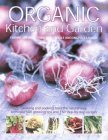Artichoke
Artichoke has long been eaten as a vegetable. The leaves were used for their diuretic properties. The leaves and roots were employed to help prevent atherosclerosis and to treat diabetes. Other reported uses include for jaundice, anemia, and dyspepsia.
- CHOLORETIC ACTIVITY - artichoke has a marked effect on increasing the biosynthesis, excretion of cholesterol and solids in the bile. This makes it a useful remedy for lowering blood fats such as cholesterol and triglycerides. In test tube studies, the flavonoids from the artichoke (e.g. luteolin) have been shown to prevent LDL-cholesterol oxidation, an effect that may reduce risk of atherosclerosis.
- DIGESTIVE TONIC - as well as improving fat breakdown and digestion artichoke has proven to be an effective tonic for many digestive problems such as nausea, constipation, dyspepsia, abdominal pain, flatulence, belching, and functional gallbladder conditions. Artichoke is likely to be beneficial in cases where appetite it diminished.
- LIVER SUPPORTIVE - the key active compound, cynarin, demonstrates significant protection against toxic agents. Much of this effect is due to the antioxidant potential of chlorogenic acid and cynarin. Oral doses of cynara have shown both liver repair and regeneration in studies.
Dosage
400mg one to three times daily. Therapeutic use may reach 1.5g - 4g per day. No restriction on long-term use.
Potential applications
Prevention and treatment of toxic conditions, particularly those involving the liver; long term prevention and treatment of cardiovascular disease; to improve and regenerate hepatic (liver) function; as an antioxidant. Some data suggests that compounds within the plant exert anti-inflammatory effects. Caffeic acids found in artichoke have exhibited activity against the HIV virus, preventing replication in tissue culture. A useful aid in preventing kidney disorders.
Known contraindications
Closure of the gallbladder. Patients with known allergies to artichoke and similar plants (Compositae family)
Interactions
None known.
Use in conjunction with
- Poor digestion - milk thistle, digestive aid, probiotics, fibre complex, EFAs
- Cholesterol reduction - garlic, antioxidant complex, vitamin C, flax seed oil, grape seed/pycnogenol
Note
Leclerc said that artichoke would be ideal for 'wringing out the hepatic sponge'.
REFERENCES
- Simon Mills & Kerry Bone. Principles and Practice of Phytotherapy. Modern Herbal Medicine. 2000.
- PDR for Herbal Medicines. Second Edition. 2000
- Melvyn R. Werbach & Michael T. Murray. Botanical Influences on Illness. A source book of clinical research. 1994
Like this page? Please link to us and let the world know!









